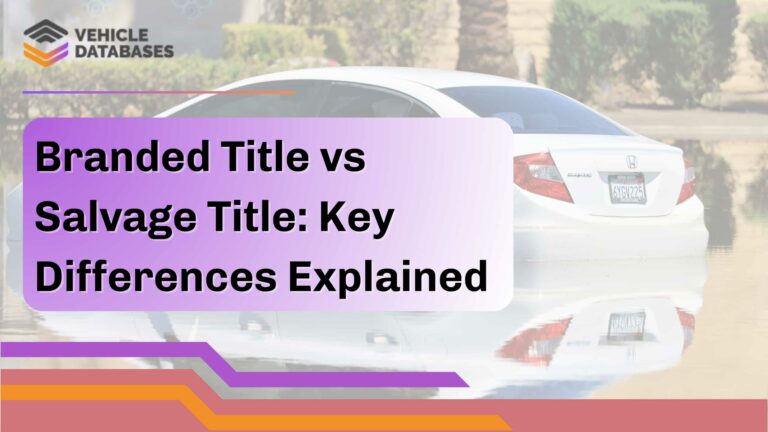Vehicle Data Extraction API is commonly used by developers to extract vehicle data from various sources. Some sources are paid and some may be free. Some common data that can be extracted using this API are vehicle make, model and year, vehicle history, VIN, registration, titles, and more.
The importance of a Vehicle Data Extraction API lies in its ability to automate and streamline the process of collecting and analyzing vehicle data. This can be especially beneficial for industries such as fleet management, insurance underwriting, and vehicle history reports. By using a Vehicle API for Data Extraction, businesses can save time and resources, improve the accuracy and completeness of their data, and make better-informed decisions.
Additionally, with the increasing use of connected cars and Internet of Things (IoT) technology, the importance of having a car data API for data extraction will continue to grow.
How Does a Vehicle Data Extraction API Work?
The process of using a Vehicle API for Data Extraction typically involves making a request to the API, which can be done using various programming languages such as Python or Java. The request will include the necessary information, such as the VIN number of the vehicle, and the API will then return the requested data in a structured format, such as JSON.
Some examples of data that can be extracted using a Vehicle Data Extraction API include
- Vehicle identification number (VIN)
- Make and model
- Year, color, and trim level
- Engine and transmission type
- Fuel economy and emissions information
- Safety ratings and recalls
- Stolen records and accidents
- Auction History and images
- Odometer readings
- Service and repairs history
This is not an exhaustive list, as different providers may offer different types of data and some providers may offer more data than others. The specific data that can be extracted will depend on the provider and the capabilities of the API.
Why Use a Vehicle Data Extraction API?
There are several benefits of using this API that anyone can utilize to grow their business. Some benefits are as follows.
- Increased efficiency and automation: One of the major benefits of using a Vehicle Data API for data Extraction is the ability to automate and streamline the process of collecting and analyzing vehicle data. This can save businesses a significant amount of time and resources that would otherwise be spent on manual data entry and analysis.
- Improved accuracy and completeness of data: By using an API for Data Extraction, businesses can access a wider range of data sources and can ensure that they are getting the most accurate and up-to-date information available. This can lead to more informed decisions and can help to mitigate the risk of errors and inaccuracies.
- Cost savings: Using a Vehicle Data Extraction API can also lead to cost savings for businesses. Automating the process of data collection and analysis can reduce labor costs, and having access to more accurate and complete data can help businesses make better-informed decisions that can ultimately lead to cost savings. Additionally, using an API can eliminate the need for expensive software licenses or the need for an in-house team to develop and maintain a vehicle data extraction system.
Use Cases
Here are some common uses of car Data extraction API uses.
- Fleet management: One of the most common use cases for a Vehicle Data Extraction API is fleet management. Fleet managers can use the API to track and manage the vehicles in their fleet, including information such as location, fuel efficiency, and maintenance records. This can help fleet managers make better decisions about scheduling maintenance, optimizing routes, and managing fuel costs.
- Insurance underwriting: Insurance companies can use a Vehicle Data Extraction API to access information about a vehicle, such as its make, model, and accident history when underwriting an insurance policy. This can help insurance companies assess the risk associated with insuring a particular vehicle and can ultimately lead to more accurate and cost-effective policies.
- Vehicle history reports: An API data extraction SDK can also be used to generate vehicle history reports. These reports can provide valuable information to potential buyers, such as accident history, number of previous owners, and service records. This can help buyers make more informed decisions when purchasing a used vehicle.
Overall, the use of a Vehicle Data Extraction API can bring significant benefits to industries that rely on vehicle data. The API can provide real-time data and automate the process of data collection, which can improve decision-making, reduce costs, and increase efficiency.
Choosing the Right Vehicle Data Extraction API
When choosing a Vehicle Data Extraction API, it is important to consider the following factors:
- Data coverage: The first and foremost consideration should be the data coverage offered by the API provider. The provider should cover all the data that you want to extract, and they should cover the countries you want to extract data from.
Data accuracy: It is important to ensure that the data provided by the API is accurate and up-to-date. This can be verified by checking the provider’s documentation or by requesting samples of the data. - Security: Make sure the API provider has a good track record of protecting the data they provide and that they have a security protocol in place to keep your data safe.
Scalability: Consider the scalability of the API and ensure that it can handle a large number of requests if you plan to use it for a large fleet of vehicles. - Integration: Make sure the API can be easily integrated with your existing systems and that the provider has good documentation and support to help you with the integration.
When comparing different providers, it is also important to consider their pricing plans and the specific features and data they offer. Some providers may offer more data and features than others, so it is important to find the provider that best fits your specific needs.
It is also a good idea to read reviews of the different providers and to reach out to them to ask about their offerings and to request samples of their data. This will help you make an informed decision and choose the best provider for your specific needs. You may also want to consider testing their services first – many API providers offer free demos for you to analyze their products firsthand.
Vehicle Databases provides data extraction APIs for different types of vehicle data extractions like VIN decoding API, Vehicle Specs API, Market Value API, Car Images API, Car History API, Window Sticker API, and more. Their pricing is reasonable and they also offer demo services to their customers.
Final Words
The use of a car Data API for Data Extraction can bring significant benefits such as increased efficiency and automation, improved accuracy and completeness of data, and cost savings.
It is particularly beneficial in industries such as fleet management, insurance underwriting, and vehicle history reports. When choosing a provider, it is important to consider factors such as data coverage, accuracy, security, scalability, and ease of integration.
The future outlook for the use of Car Data Extraction APIs is very promising. With the increasing use of connected cars and IoT technology, the need for real-time and accurate vehicle data will only continue to grow. As a result, we can expect to see an increase in the number of providers and offerings in the market and more industries will start to adopt this technology in order to improve their operations.





